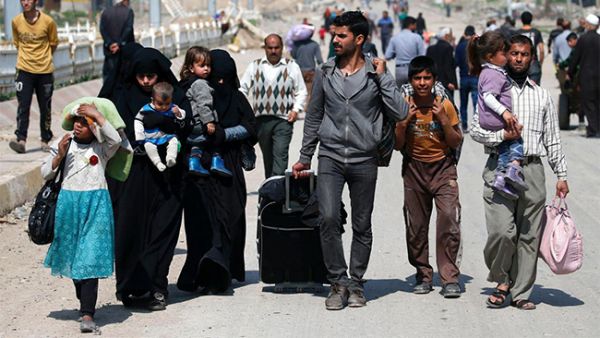An Iraqi intelligence officer who supervises a screening center in Mosul said that over the past week between 1,500 and 2,000 people fleeing Daesh-held territory passed through his position each day.
Col. Khalid Jaburi said those suspected of having ties with Daesh are held in an abandoned amusement park next door to an abandoned hotel in the city’s east.
The UN said the number of people fleeing is between 2,000 and 3,500 each day.
On Thursday, Iraqi forces battled the last remaining Daesh fighters in Mosul’s Old City, where the UN said up to 20,000 civilians are trapped and in “extreme danger.”
In neighboring Syria, US-backed forces are facing fierce resistance from Daesh as they wage a parallel offensive to recapture the city of Raqqa from the terrorists.
The fighting in both cities is taking place in densely populated residential neighborhoods, which are sustaining a high civilian death toll and heavy damage as diehard militants put up a desperate last stand.
“Our estimate at this stage is that in the final pockets of (Mosul’s) Old City, there could be as many as 15,000 civilians, possibly even as high as 20,000,” UN humanitarian coordinator in Iraq Lise Grande said.
“They’re in extreme danger from bombardment, from artillery crossfire. The (Daesh) fighters that are still there are still directly targeting civilians if they try to leave,” she said.
More than eight months after the start of the operation to retake Mosul from Daesh, the extremist fighters have gone from fully controlling the city to holding a small pocket on the west bank of the River Tigris that flows through it.
The damage caused by the fighting in west Mosul — and the cost of addressing it — is huge.
There are “44 residential neighborhoods in western Mosul. Six are nearly completely destroyed... Twenty-two neighborhoods are moderately damaged and 16 are lightly damaged,” Grande said.
Based on a preliminary assessment, the first phase of “stabilization” in west Mosul — which includes basic services, infrastructure, housing, education and police stations — will cost $707 million.
That is nearly double the expected figure, “because the level of damage in western Mosul is far higher than what we feared it would be,” she said.








